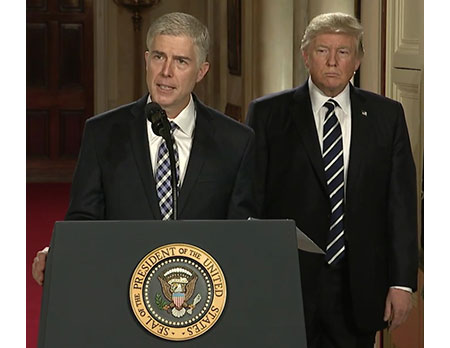Gorsuch: Anonymous Speech Has Value, Too
The smarter way to stay on top of the multichannel video marketplace. Sign up below.
You are now subscribed
Your newsletter sign-up was successful

WASHINGTON — Supreme Court nominee Neil Gorsuch refused to be drawn into a debate about dark money and disclosure of political ads during questioning by Sen. Sheldon Whitehouse (D-Rhode Island).
Whitehouse pointed to a $10 million ad campaign being mounted by supporters of his nomination, but whose actual backers had not been disclosed. The senator asked Gorsuch if there is a public interest in knowing who was contributing to that campaign.
The veteran U.S. appeals court judge responded that if Congress wanted there to more ad disclosure, it had "robust authority" to do so, but that he was not going to be drawn into politics and that it was not his fault if Congress had not passed such a law requiring the disclosure of so-called dark money.
Various Democratic legislative attempts to boost disclosure since the Citizens United decision have failed to gain traction, including with enough Democrats.
Gorsuch did say that that there was a value in anonymous speech, which the Supreme Court had found in a case where it concluded that disclosure could be a weapon to help silence people.
Whitehouse said that the Supreme Court had gotten into politics through the Citizens United decision — which allowed corporate funding of political ads — but Gorsuch said he saw it as judges presented with a case doing their best to decide it on the facts and the law.
He said judges make half the people unhappy 100% of the time and he did not question their motives. Whitehouse said in the case of Citizens United, it was more like making 90% of the people unhappy.
The smarter way to stay on top of the multichannel video marketplace. Sign up below.
Whitehouse pressed the judge on whether the $10 million campaign pushing his nomination was of concern.
A slightly testy Gorsuch said there were a number of things he regretted about the nomination process, including the fact that Byron White's confirmation hearing took 90 minutes and he was allowed to smoke during it, as well as the fact that Gorsuch was putting his family through it. But he said that Congress made the laws, and if they wanted to pass a disclosure law, they could.
Contributing editor John Eggerton has been an editor and/or writer on media regulation, legislation and policy for over four decades, including covering the FCC, FTC, Congress, the major media trade associations, and the federal courts. In addition to Multichannel News and Broadcasting + Cable, his work has appeared in Radio World, TV Technology, TV Fax, This Week in Consumer Electronics, Variety and the Encyclopedia Britannica.

